教学课件 --冀教版中学英语七年级(下) UNIT7 Lesson40
文档属性
| 名称 | 教学课件 --冀教版中学英语七年级(下) UNIT7 Lesson40 | 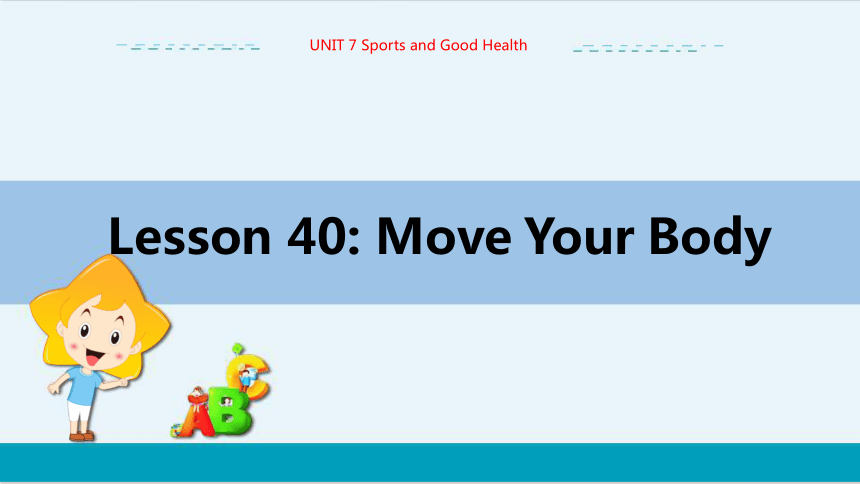 | |
| 格式 | pptx | ||
| 文件大小 | 2.2MB | ||
| 资源类型 | 试卷 | ||
| 版本资源 | 冀教版 | ||
| 科目 | 英语 | ||
| 更新时间 | 2024-02-21 19:48:13 | ||
图片预览

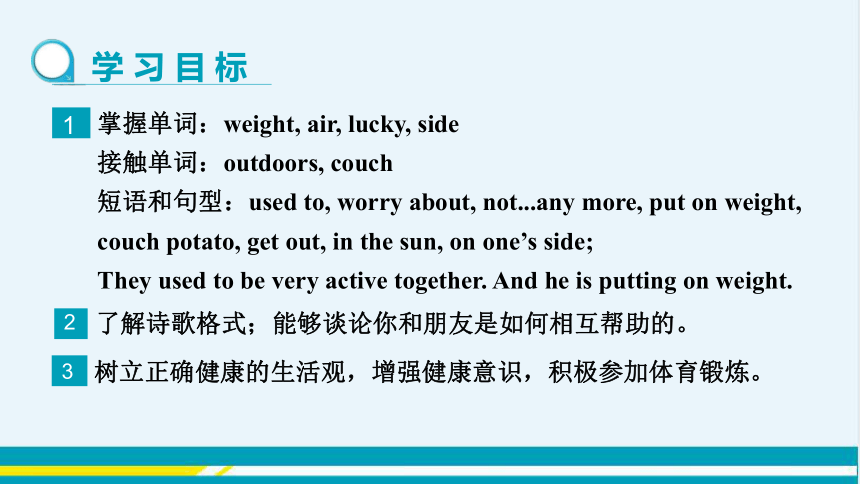
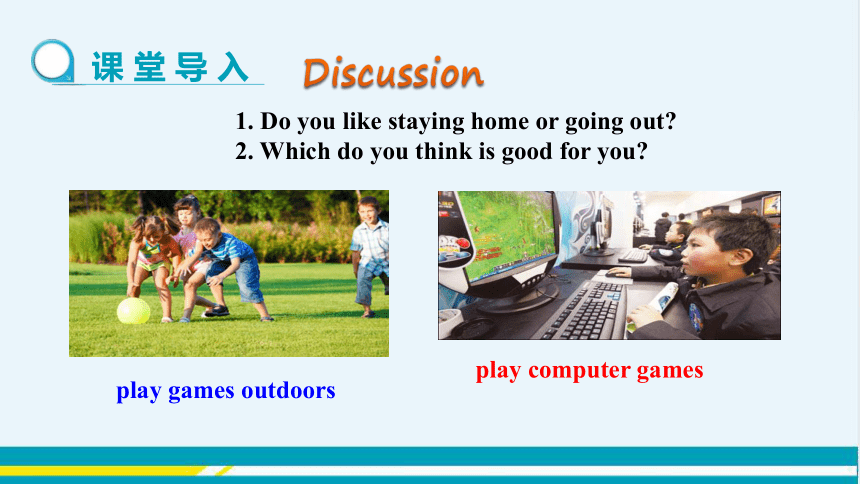
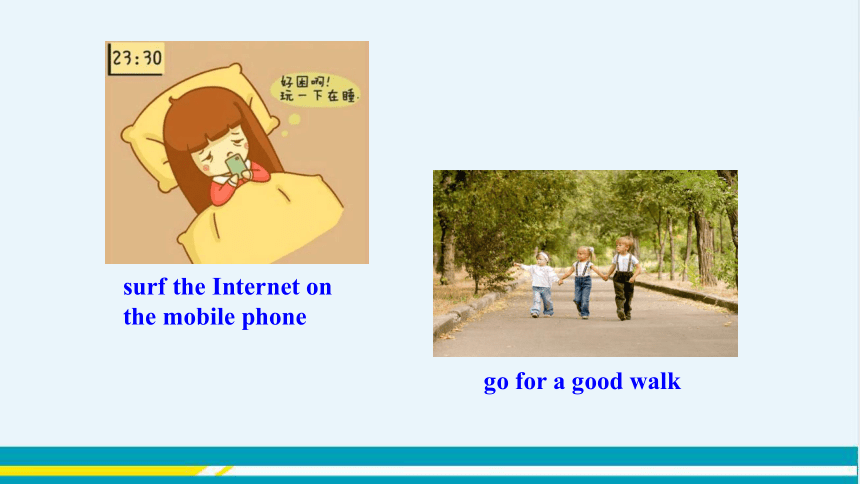
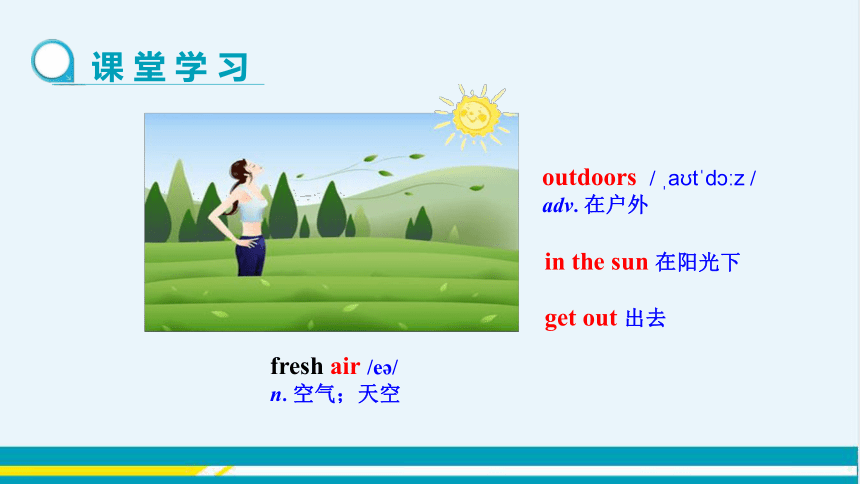
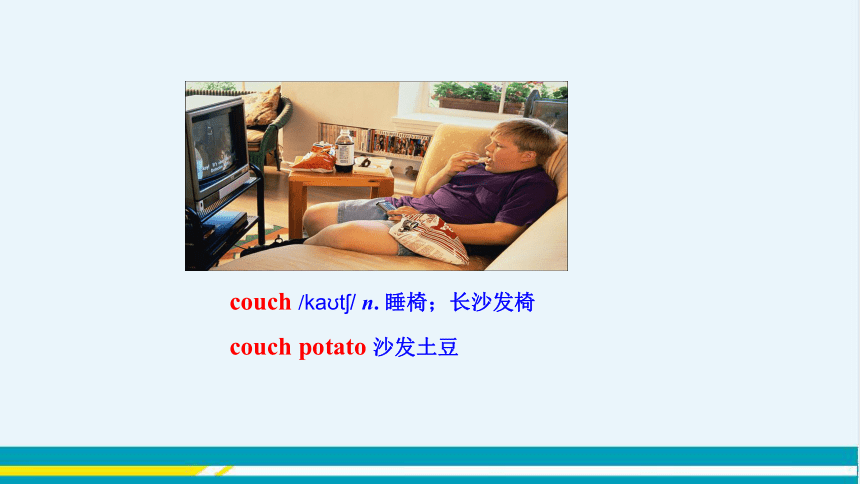
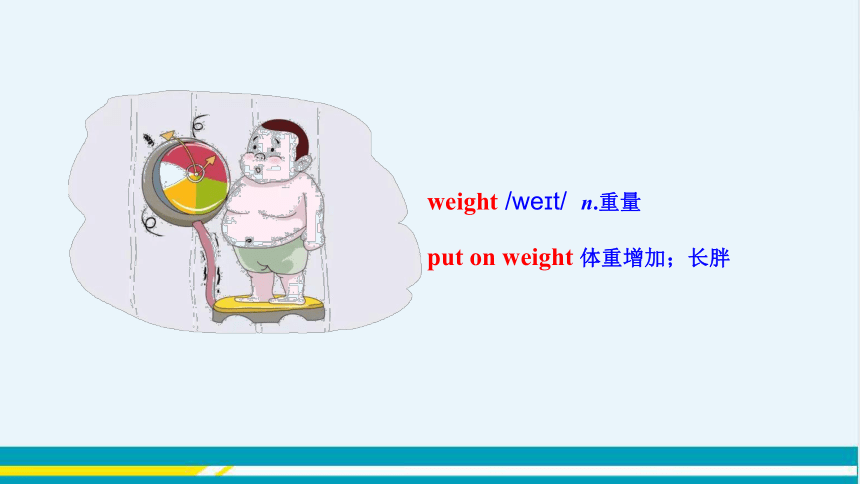
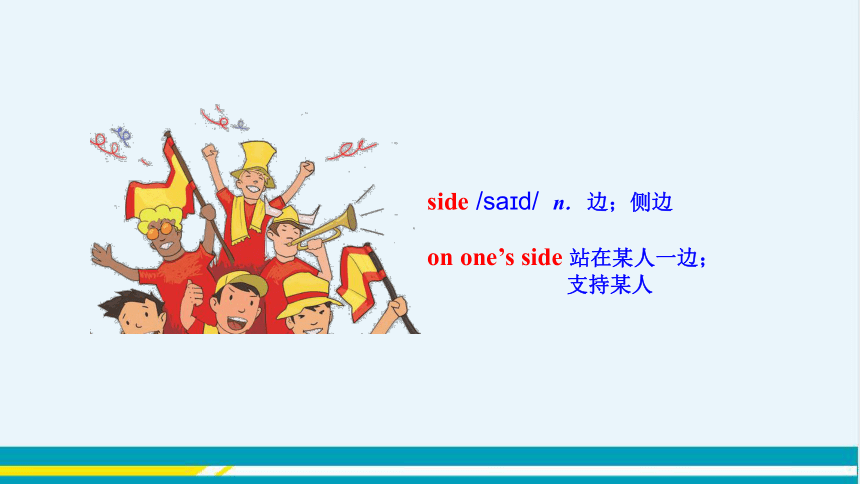
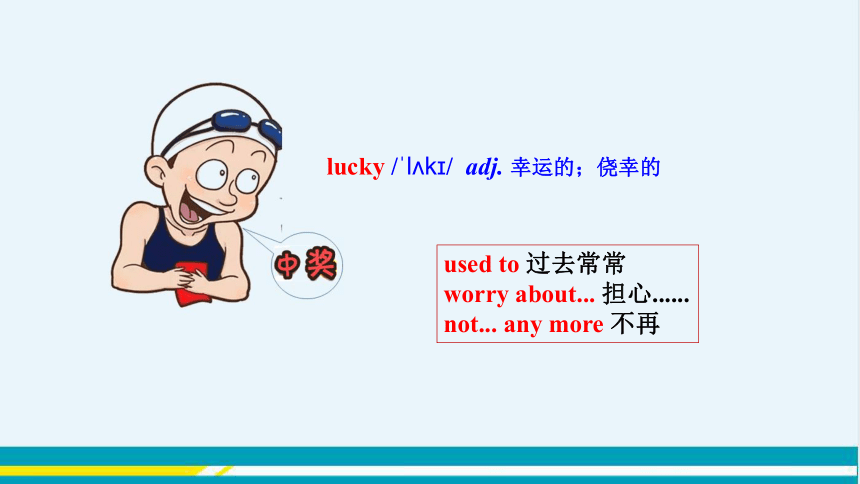
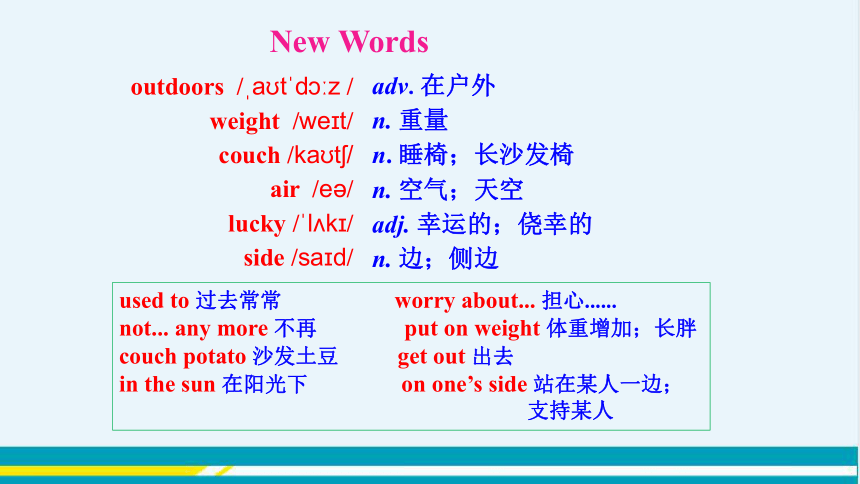
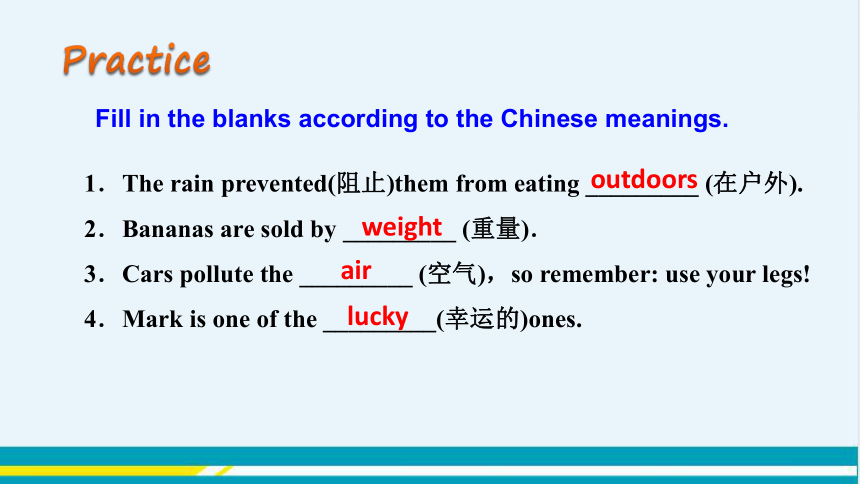
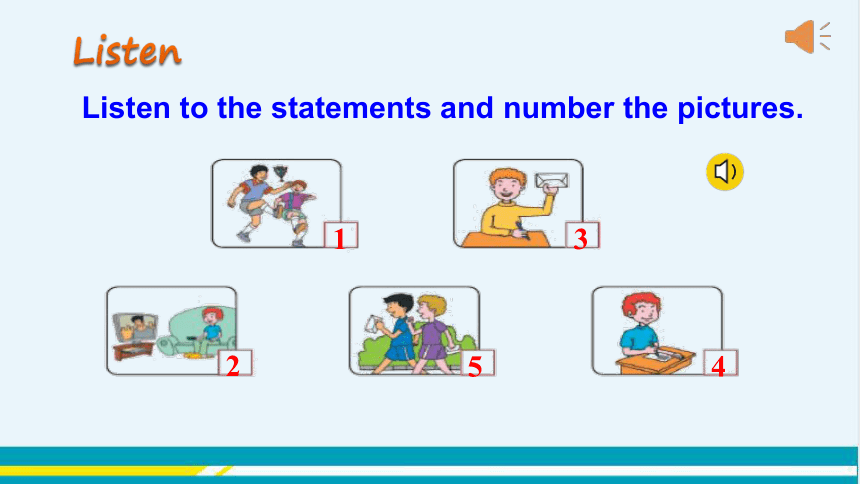
文档简介
(共30张PPT)
Lesson 40: Move Your Body
UNIT 7 Sports and Good Health
学 习 目 标
掌握单词:weight, air, lucky, side
接触单词:outdoors, couch
短语和句型:used to, worry about, not...any more, put on weight, couch potato, get out, in the sun, on one’s side;
They used to be very active together. And he is putting on weight.
1
3
树立正确健康的生活观,增强健康意识,积极参加体育锻炼。
了解诗歌格式;能够谈论你和朋友是如何相互帮助的。
2
1. Do you like staying home or going out
2. Which do you think is good for you
Discussion
课 堂 导 入
play games outdoors
play computer games
go for a good walk
surf the Internet on the mobile phone
课 堂 学 习
fresh air /e / n.空气;天空
outdoors / a t d z / adv.在户外
in the sun 在阳光下
get out 出去
couch /ka t / n. 睡椅;长沙发椅
couch potato 沙发土豆
weight /we t/ n.重量
put on weight 体重增加;长胖
side /sa d/ n. 边;侧边
on one’s side 站在某人一边;
支持某人
lucky / l k / adj. 幸运的;侥幸的
used to 过去常常
worry about... 担心......
not... any more 不再
outdoors / a t d z /
weight /we t/
couch /ka t /
air /e /
lucky / l k /
side /sa d/
adv.在户外
n. 重量
n. 睡椅;长沙发椅
n. 空气;天空
adj. 幸运的;侥幸的
n. 边;侧边
New Words
used to 过去常常 worry about... 担心......
not... any more 不再 put on weight 体重增加;长胖
couch potato 沙发土豆 get out 出去
in the sun 在阳光下 on one’s side 站在某人一边;
支持某人
1.The rain prevented(阻止)them from eating _________ (在户外).
2.Bananas are sold by _________ (重量).
3.Cars pollute the _________ (空气),so remember: use your legs!
4.Mark is one of the _________(幸运的)ones.
Practice
outdoors
weight
air
lucky
Fill in the blanks according to the Chinese meanings.
Listen to the statements and number the pictures.
5
4
3
2
1
Listen
Read the lesson and write true (T) or false (F).
1. Tim used to be very active. ( )
2. Ben watches too much TV and plays too many computer games. ( )
3. Ben and Tim are both putting on weight. ( )
4. Tim finds a letter at his desk. ( )
5. Ben and Tim will meet and go for a good walk. ( )
T
F
F
F
T
Read
Rules
day—way
fun—sun
/ e /
/ n /
funny—lucky side—wide o’clock—walk
/ /
/ a d /
/ k /
Find and translate
used to
play games
worry about
not... any more
bad habits
put on weight
couch potato
get out
have fun
in the sun
on one’s side
go for a walk
过去常常
做游戏
担心......
不再
坏习惯
体重增加;长胖
沙发土豆
出去
过得愉快
在阳光下
站在某人一边;支持某人
出去散步
Fill in the blanks with the correct forms of the phrases in the box.
worry about go for a walk put on weight used to any more
1. A: How do you go to school, Mike
B: I __________ walk to school, but now I ride a bike.
2. A: Be careful and don’t stay out too late.
B: Don’t ______________ me, Mum! I will be OK!
3. A: How is Tom these days
B: He doesn’t get any exercise and he is not eating healthy food.
He is ________________.
4. A: You and Jason are neighbours, right
B: No. He moved to a new house. He is not my neighbour ______________.
5. A: What do you like to do after supper
B: I like to ______________.
used to
worry about
putting on weight
Practice
any more
go for a walk
Good friends are important. They help each other. Did a
friend ever help you Did you ever help a friend What
happened Talk about it .
Work in groups
My best friend
Li Ming is my best friend. He is always helpful and friendly to me. We have the same interests—basketball , football and music. Whenever we have time after class, we always play or listen to music together. One year ago , I didn’t do well in English. But he is good at it. So he often helped me with my English. With his help, my English has improved a lot. And I often help him with his math. We help each other.
An example
1. The new words and phrases
weight, air, lucky, side
used to, worry about, not...any more, put on weight,
couch potato, get out, in the sun, on one’s side;
2. How to write poems.
rhyming words
3. Talk about how you helped your friends or how your friends
helped you.
Sum up
1. They used to be very active together.
他们过去常常在一起,很活跃。
used to 意为“过去经常,以前常常”,其后接动词原形。它表示过去
存在某种状态或者过去的某种经常性、习惯性的行为或者动作,并意味
着这种动作目前已经不存在,所以它只表示过去,不表示现在。
I used to have long hair.我过去留着长发。
Language points
含 used to的句式结构如下:
①肯定句:主语+used to+动词原形+其他。
I used to play with my friends after school.
过去放学后我常常和朋友们一起玩。
②否定句:主语+didn't+use to (或usedn't to)+动词原形+其他。
You didn't use to/usedn’t to like pop songs.
你过去不喜欢流行歌曲。
③一般疑问句:Did+主语+use to+动词原形+其他?
Did your sister use to be quiet?你的妹妹过去很安静吗?
【拓展】
① be used to doing sth. 意为“习惯于做某事”,其中的to是介词, 后接动词
时要用v.-ing形式。
He is used to living in the country. 他已习惯于住在乡下。
② be used to do sth. 意为“被用来做某事”,是动词use的被动语态结构,
其中的to为不定式符号,其后要接动词原形)
This kind of machine is used to make books.这种机器是用来制造书的。
2.They played games outdoors.他们在户外玩游戏。
outdoors〔副词〕在户外。其反义词为indoors(在室内)。
It was warm enough to be outdoors all afternoon.
天气很暖和,整个下午都可以待在户外。
【拓展】 outdoor〔形容词〕户外的,在户外的。其反义词为indoor(室内的)。
3.Tim is not active any more.蒂姆不再活跃了。
not...any more意为“不再……”,相当于no more。表示在次数上或数量上
不再……
I don’t like this pair of shoes any more.我不再喜欢这双鞋了。
4. He watches too much TV and plays too many computer games.
他看太多电视,玩太多电脑游戏。
【辨析】too much,too many与much too
① too much 意为“太多”,其后跟不可数名词;还可用作副词短语用来修饰动词。
This bottle was filled with too much water.这个瓶子里装了太多的水。
He shouldn’t talk too much.他不应讲得太多。
② too many 意为“太多”,其后跟可数名词复数。
There are too many people in the hall.大厅里有太多的人。
③ much too 意为“太,非常”,常用来修饰形容词或副词,但不能用来修饰动词。
It rains much too heavily.雨下得太大了。
5.And he is putting on weight.而且,他的体重在增加。
weight〔名词〕重量。其动词形式为weigh(重达……)。常用短语:
put on weight 增加体重 lose weight减肥
by weight以重量计算 the weight of... ……的重量
in weight在重量方面 over weight超重。
Eating too much junk food can put on weight.
吃太多垃圾食品会增加体重。
She is on the way to lose weight.她正在减肥当中。
6. But I feel really lucky.但我真的感到很幸运。
lucky〔形容词〕幸运的。它既可作表语,也可作定语。
其名词形式为luck (运气);副词形式为luckily (幸运地)。
She is really a lucky dog.她的确是个幸运儿。
7.With a true friend on my side, ...身边有一个真正的朋友……
side〔名词〕边,旁边,侧边。常用短语:
on one's side站在某人一边,支持某人
on the left/right side在左/右边
on one's left/right side在某人的左/右边
on both sides of...在……的两边
on each side of...在……的每一边
There are lots of trees on both sides of the river. 河的两边有许多树。
My brother is on my side on this.
在这个问题上,我哥哥支持我。
1. My grandfather used to_________ (live) in the country, but now he
lives with us.
2. Dick decided to lose________(weigh) by eating less and doing more
exercise.
3. The boy is _________ (luck) to have a chance to speak to foreigners. 4. I’m on _________ (you) side in this question.
5. Let’s _________ (visit) the Great Wall tomorrow.
live
weight
lucky
课 堂 达 标
用所给词的适当形式填空。
your
visit
1. Review and recite the important points of Lesson 40.
2. It’s very important for friends to help each other.
Did any of your friends help you Write something
to express your thanks to him/her.
Homework
Thank you !
Lesson 40: Move Your Body
UNIT 7 Sports and Good Health
学 习 目 标
掌握单词:weight, air, lucky, side
接触单词:outdoors, couch
短语和句型:used to, worry about, not...any more, put on weight, couch potato, get out, in the sun, on one’s side;
They used to be very active together. And he is putting on weight.
1
3
树立正确健康的生活观,增强健康意识,积极参加体育锻炼。
了解诗歌格式;能够谈论你和朋友是如何相互帮助的。
2
1. Do you like staying home or going out
2. Which do you think is good for you
Discussion
课 堂 导 入
play games outdoors
play computer games
go for a good walk
surf the Internet on the mobile phone
课 堂 学 习
fresh air /e / n.空气;天空
outdoors / a t d z / adv.在户外
in the sun 在阳光下
get out 出去
couch /ka t / n. 睡椅;长沙发椅
couch potato 沙发土豆
weight /we t/ n.重量
put on weight 体重增加;长胖
side /sa d/ n. 边;侧边
on one’s side 站在某人一边;
支持某人
lucky / l k / adj. 幸运的;侥幸的
used to 过去常常
worry about... 担心......
not... any more 不再
outdoors / a t d z /
weight /we t/
couch /ka t /
air /e /
lucky / l k /
side /sa d/
adv.在户外
n. 重量
n. 睡椅;长沙发椅
n. 空气;天空
adj. 幸运的;侥幸的
n. 边;侧边
New Words
used to 过去常常 worry about... 担心......
not... any more 不再 put on weight 体重增加;长胖
couch potato 沙发土豆 get out 出去
in the sun 在阳光下 on one’s side 站在某人一边;
支持某人
1.The rain prevented(阻止)them from eating _________ (在户外).
2.Bananas are sold by _________ (重量).
3.Cars pollute the _________ (空气),so remember: use your legs!
4.Mark is one of the _________(幸运的)ones.
Practice
outdoors
weight
air
lucky
Fill in the blanks according to the Chinese meanings.
Listen to the statements and number the pictures.
5
4
3
2
1
Listen
Read the lesson and write true (T) or false (F).
1. Tim used to be very active. ( )
2. Ben watches too much TV and plays too many computer games. ( )
3. Ben and Tim are both putting on weight. ( )
4. Tim finds a letter at his desk. ( )
5. Ben and Tim will meet and go for a good walk. ( )
T
F
F
F
T
Read
Rules
day—way
fun—sun
/ e /
/ n /
funny—lucky side—wide o’clock—walk
/ /
/ a d /
/ k /
Find and translate
used to
play games
worry about
not... any more
bad habits
put on weight
couch potato
get out
have fun
in the sun
on one’s side
go for a walk
过去常常
做游戏
担心......
不再
坏习惯
体重增加;长胖
沙发土豆
出去
过得愉快
在阳光下
站在某人一边;支持某人
出去散步
Fill in the blanks with the correct forms of the phrases in the box.
worry about go for a walk put on weight used to any more
1. A: How do you go to school, Mike
B: I __________ walk to school, but now I ride a bike.
2. A: Be careful and don’t stay out too late.
B: Don’t ______________ me, Mum! I will be OK!
3. A: How is Tom these days
B: He doesn’t get any exercise and he is not eating healthy food.
He is ________________.
4. A: You and Jason are neighbours, right
B: No. He moved to a new house. He is not my neighbour ______________.
5. A: What do you like to do after supper
B: I like to ______________.
used to
worry about
putting on weight
Practice
any more
go for a walk
Good friends are important. They help each other. Did a
friend ever help you Did you ever help a friend What
happened Talk about it .
Work in groups
My best friend
Li Ming is my best friend. He is always helpful and friendly to me. We have the same interests—basketball , football and music. Whenever we have time after class, we always play or listen to music together. One year ago , I didn’t do well in English. But he is good at it. So he often helped me with my English. With his help, my English has improved a lot. And I often help him with his math. We help each other.
An example
1. The new words and phrases
weight, air, lucky, side
used to, worry about, not...any more, put on weight,
couch potato, get out, in the sun, on one’s side;
2. How to write poems.
rhyming words
3. Talk about how you helped your friends or how your friends
helped you.
Sum up
1. They used to be very active together.
他们过去常常在一起,很活跃。
used to 意为“过去经常,以前常常”,其后接动词原形。它表示过去
存在某种状态或者过去的某种经常性、习惯性的行为或者动作,并意味
着这种动作目前已经不存在,所以它只表示过去,不表示现在。
I used to have long hair.我过去留着长发。
Language points
含 used to的句式结构如下:
①肯定句:主语+used to+动词原形+其他。
I used to play with my friends after school.
过去放学后我常常和朋友们一起玩。
②否定句:主语+didn't+use to (或usedn't to)+动词原形+其他。
You didn't use to/usedn’t to like pop songs.
你过去不喜欢流行歌曲。
③一般疑问句:Did+主语+use to+动词原形+其他?
Did your sister use to be quiet?你的妹妹过去很安静吗?
【拓展】
① be used to doing sth. 意为“习惯于做某事”,其中的to是介词, 后接动词
时要用v.-ing形式。
He is used to living in the country. 他已习惯于住在乡下。
② be used to do sth. 意为“被用来做某事”,是动词use的被动语态结构,
其中的to为不定式符号,其后要接动词原形)
This kind of machine is used to make books.这种机器是用来制造书的。
2.They played games outdoors.他们在户外玩游戏。
outdoors〔副词〕在户外。其反义词为indoors(在室内)。
It was warm enough to be outdoors all afternoon.
天气很暖和,整个下午都可以待在户外。
【拓展】 outdoor〔形容词〕户外的,在户外的。其反义词为indoor(室内的)。
3.Tim is not active any more.蒂姆不再活跃了。
not...any more意为“不再……”,相当于no more。表示在次数上或数量上
不再……
I don’t like this pair of shoes any more.我不再喜欢这双鞋了。
4. He watches too much TV and plays too many computer games.
他看太多电视,玩太多电脑游戏。
【辨析】too much,too many与much too
① too much 意为“太多”,其后跟不可数名词;还可用作副词短语用来修饰动词。
This bottle was filled with too much water.这个瓶子里装了太多的水。
He shouldn’t talk too much.他不应讲得太多。
② too many 意为“太多”,其后跟可数名词复数。
There are too many people in the hall.大厅里有太多的人。
③ much too 意为“太,非常”,常用来修饰形容词或副词,但不能用来修饰动词。
It rains much too heavily.雨下得太大了。
5.And he is putting on weight.而且,他的体重在增加。
weight〔名词〕重量。其动词形式为weigh(重达……)。常用短语:
put on weight 增加体重 lose weight减肥
by weight以重量计算 the weight of... ……的重量
in weight在重量方面 over weight超重。
Eating too much junk food can put on weight.
吃太多垃圾食品会增加体重。
She is on the way to lose weight.她正在减肥当中。
6. But I feel really lucky.但我真的感到很幸运。
lucky〔形容词〕幸运的。它既可作表语,也可作定语。
其名词形式为luck (运气);副词形式为luckily (幸运地)。
She is really a lucky dog.她的确是个幸运儿。
7.With a true friend on my side, ...身边有一个真正的朋友……
side〔名词〕边,旁边,侧边。常用短语:
on one's side站在某人一边,支持某人
on the left/right side在左/右边
on one's left/right side在某人的左/右边
on both sides of...在……的两边
on each side of...在……的每一边
There are lots of trees on both sides of the river. 河的两边有许多树。
My brother is on my side on this.
在这个问题上,我哥哥支持我。
1. My grandfather used to_________ (live) in the country, but now he
lives with us.
2. Dick decided to lose________(weigh) by eating less and doing more
exercise.
3. The boy is _________ (luck) to have a chance to speak to foreigners. 4. I’m on _________ (you) side in this question.
5. Let’s _________ (visit) the Great Wall tomorrow.
live
weight
lucky
课 堂 达 标
用所给词的适当形式填空。
your
visit
1. Review and recite the important points of Lesson 40.
2. It’s very important for friends to help each other.
Did any of your friends help you Write something
to express your thanks to him/her.
Homework
Thank you !
同课章节目录
- Unit 1 A Trip to the Silk Road
- Lesson 1 A Trip to China
- Lesson 2 Meet You in Beijing
- Lesson 3 A Visit to Xi'an
- Lesson 4 A Visit to Lanzhou
- Lesson 5 Another Stop along the Silk Road
- Lesson 6 Jenny's Diary
- Unit 2 It's Show Time!
- Lesson 7 What's Your Project about?
- Lesson 8 Marco Polo and the Silk Road
- Lesson 9 Danny's School Project
- Lesson 10 Music and Dance
- Lesson 11 Food in China
- Lesson 12 A Blog about the Silk Road
- Unit 3 School Life
- Lesson 13 How Is School Going?
- Lesson 14 Jenny's School Life
- Lesson 15 Making a Difference
- Lesson 16 We Are with You!
- Lesson 17 School Science Fai
- Lesson 18 Teaching in China
- Unit 4 After-School Activities
- Lesson 19 A Dinner Date
- Lesson 20 Join Our Club!
- Lesson 21 What Is Your Club Type?
- Lesson 22 Big Plans for the Weekend
- Lesson 23 A Weekend with Grandma
- Lesson 24 How was Your Weekend?
- Unit 5 I Love Learning English!
- Lesson 25 A Phone Friend
- Lesson 26 Online Phone Calls
- Lesson 27 Amazing English
- Lesson 28 How Do I Learn English?
- Lesson 29 A Door to the World
- Lesson 30 Writing an E-mail in English
- Unit 6 Seasons
- Lesson 31 What Strange Weather!
- Lesson 32 I Can't Wait for Winter!
- Lesson 33 Kim's Favourite Season
- Lesson 34 Steven's Report
- Lesson 35 Surfing in Sydney
- Lesson 36 Spring in China
- Unit 7 Sports and Good Health
- Lesson 37 You Are What You Eat!
- Lesson 38 Stay Healthy!
- Lesson 39 Danny's Report
- Lesson 40 Move Your Body
- Lesson 41 Were People Healthy Then?
- Lesson 42 Know Yourself
- Unit 8 Summer Holiday Is Coming!
- Lesson 43 Have a Good Summer!
- Lesson 44 Volunteering in Summe
- Lesson 45 Baseball Season
- Lesson 46 Get Ready for Summer Holiday!
- Lesson 47 Summer Plans
- Lesson 48 Li Ming's Summer Holiday
